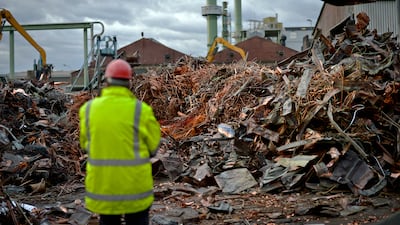As the great and the good in the world of artificial intelligence gathered at the CogX Festival in south-east London this week, a few spoke on the environmental impact of the coming acceleration of the technology.
Exponential growth of AI will require many more than the world's current 8,000 data centres. Also, the hardware needed in the coming years will be far more complex.
This means more metal – a lot more metal.
More copper wire and plating to conduct electricity, more gold for high-speed connections and more palladium for power delivery.
So how can this demand be supplied without a huge increase the smelters and toxic chemicals needed to process these metals?
'Implementing science fiction'
One high-tech company believes it has the answer: dissolve the metals currently in electronic waste and recycle them in a way that is environmental friendly.
“We’re implementing science fiction,” said Leo Howden, managing director and co-founder of Descycle.
“We’ve taken over 20 years of discovery and innovation in a new field of chemistry and created a catalyst for profound change in the metal industry.”
Descycle creates technology based on a new class of chemistry known as deep eutectic solvents, or Des, that are mixtures of organic, biodegradable and recyclable commodities.
“Des can take a metal and transform it so that it’s able to move into a liquid, just like a cube of sugar dissolves in a cup of coffee,” Mr Howden told the CogX Festival.

Des are made of elements such as carbon, oxygen, nitrogen and hydrogen which, when combined, become liquid because the energy that is holding them together drops.
“And this liquid loves metal ions,” Mr Howden said.
“It loves them so much that when we put metal into the solution, it dissolves.”
That means the metal in e-waste such as old circuit boards can be recovered without the need for high temperatures in energy-hungry smelters or toxic chemicals that might draw the metals out.
Currently, only 17 per cent of e-waste is recycled. The rest goes to the landfill or is sent to underdeveloped countries where it eventually seeps into the environment.
Descycle's technology cannot only tailor the process to take one metal out or leave another behind, but it also means the process can be achieved on a much smaller scale.
“We can recover a range of different metals but crucially without the associated environmental impact,” Mr Howden said.
“The waste that’s generally thrown away is an amazing opportunity to recycle metals from one generation to the next, creating a circular economy.
“If you want copper for electrification, we can get the copper out. If you want nickel, cobalt, manganese for electric vehicle batteries, we can get that out, too.”
Mr Howden believes that without recycling technology such as Des, the growth in AI and decarbonising products such as electric vehicles could lead the world down a difficult environmental path.
“Globally, over 50 million tonnes of electronic waste is produced every year and that’s forecast to double in the near future,” he explained.
“If you want to visualise that, think of 125,000 jumbo jets stacked side by side – more jumbo jets than have ever been created. It’s an environmental emergency.”


